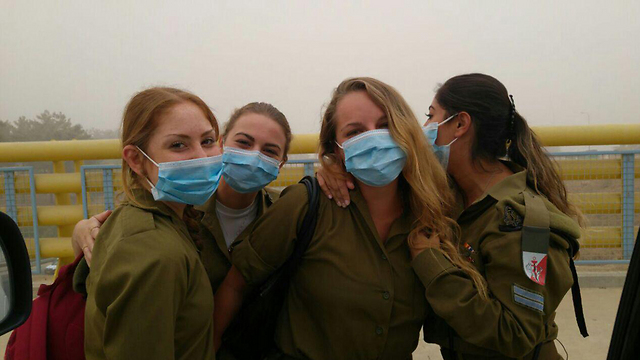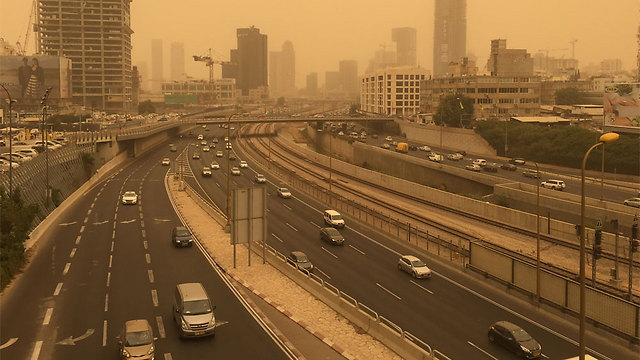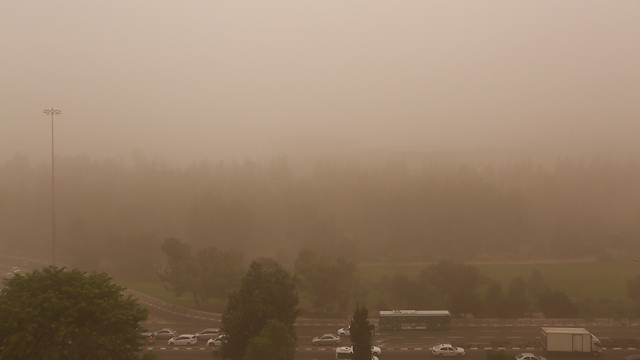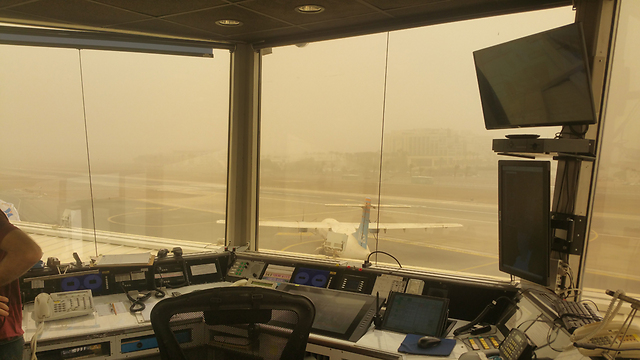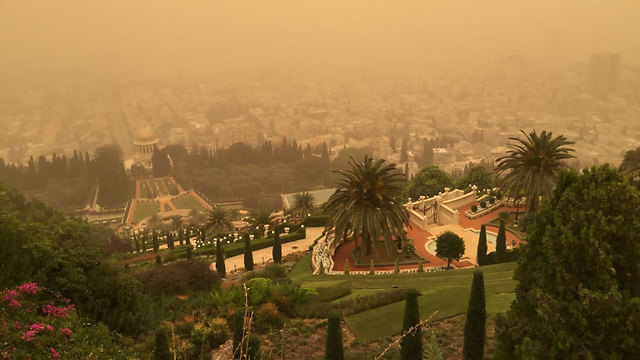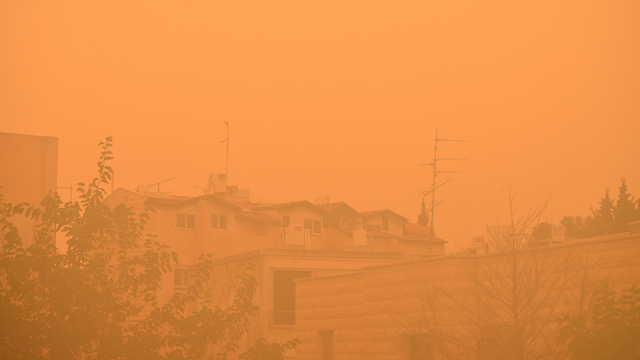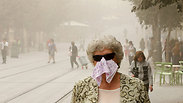
Haze watch: No blue skies until next week
Due to the lack of strong winds and the mass of sand in the air, the current haze and heatwave are set to accompany us into the weekend and up to Rosh HaShana.
Tuesday marked the heaviest haze during the month of September in the last 75 years, and the rest of the week is not going to be any better. The heavy haze was still present Wednesday morning, suffocating all of Israel, and according to the latest forecasts, we won't be seeing blue skies until Rosh HaShana early next week.
Due to the heavy presence of pollutants in the air, the Environmental Protection Ministry has called for the cancellation of all school trips, and outdoor activities.
The ministry recommended that anyone suffering from heart and lung conditions, the elderly, and pregnant women, avoid being outdoors. To schools the ministry suggested that all recesses be held indoors, and that all sports classes be held in closed gymnasiums.
The Education Ministry has said that eight class trips have already been cancelled throughout Israel. Additionally, several other trips have been altered to avoid areas with high pollution levels.
According to the forecast, the thick haze will continue throughout the day, and will only weaken during the late afternoon hours.
Over the last day, hundreds have received medical care for breathing problems. About 70 were treated at a hospital in Safed and three were said to be in serious condition.
In addition to the continued haziness, the current heat wave is set to continue. The meteorological service has issued a heat warning for all of Israel lasting from 9am to 9pm on Wednesday and most areas are expected to experience unusually high temperatures. Areas in the east and the valleys will experience severe heat throughout the day.
Visibility is expected to be especially low. As of now, buildings are only visible within one kilometer, compared to 8-10 kilometer visibility on a normal day. These figures apply for all of Israel.
Twenty-six flights were canceled at Eilat's Uvda Airport on Tuesday because of the weather. Just like the day before, Israeli airlines Israir and Arkia canceled their domestic flights from the southern city of Eilat to Tel Aviv's Sde Dov and back on Wednesday, due to the harsh weather conditions.
Israir announced its morning flights were canceled, and offered passengers to take a bus from Eilat to Tel Aviv or vice versa, though the company said it will not cover the bus fare. Flights were supposed to resume at 11am, but were pushed back further to 5pm, if weather permits.
"The passengers will be reimbursed in full for the flight tickets they purchased," Israir said.
Arkia canceled all of its domestic flights on Wednesday. If the weather improves, the airline will resume its scheduled flights on Thursday morning. Arkia was also working to add another early morning flight from Ben Gurion Airport to Eilat on Thursday.
Passengers whose flight was canceled because of the weather will be fully reimbursed, the airline said.
International flights were not affected by the cancelations and will continue as normal.
The Meteo-tech forecast center said that warm an air current stretching from Saudi Arabia to the eastern Mediterranean continues to cause the heat wave in our area.
Tzachi Vaksman, a forecaster for Meteo-tech, said that there would be a light relief during the afternoon hours, with a slow improvement in the visibility and haze density. He went on to say that no dramatic changes were expected, and the haze will remain.
The thousands of tons of sand particles in the air above us fall slowly, and as such the haze will remain for some time, he explained. This in contrast to sand storms during periods of seasonal change, which are often quite short.
Due to the lack of strong winds, the haze will remain for some time, and will continue to fall slowly. This is an unprecedented event.
The source of the haze is also important – it arrived from Syria and Iraq, while sand storms usually arrive from Egypt, and more specifically the Sahara. As a result, the storm will end only when the heat wave subsides as a result of a north-western wind. The wind is forecasted to arrive sometime this weekend, but the higher than normal temperatures are set to remain.
Eitan Mazeh, a weather quality forecaster in the Environmental Protective Minister, explained the rare phenomenon: "This started in northeast Syria. Strong winds created massive dust clouds and the air flow was in our direction. These are enormous dust clouds. Now we're expecting a very slow decline of these dust concentrations because the winds are not changing radically."
Mazeh says the improvement in the quality of air will be slow to come. "Today we'll have high levels of air pollution and probably tomorrow as well."
Particularly high temperatures
The haze is accompanied by very high temperatures. Several areas, including the coastal plains and the Shfela, experienced high temperatures throughout the entire night. Usually, temperatures drop in the evening hours, but particularly high temperatures were measured overnight.
For example, the minimum temperature in the Tel Aviv area was 29 degrees Celsius (84.2 Fahrenheit), with over 90 percent humidity. Meanwhile the average for Tel Aviv for this time of year is 23 degrees Celsius (73.4 73.4). In Jerusalem, the minimum temperature was 28 degrees Celsius (82.4 Fahrenheit), while the average for this time of year is 19 degrees Celsius (66.2 Fahrenheit). The Dead Sea, meanwhile, experienced 36 degrees Celsius (96.8 overnight Fahrenheit), about eight degrees above the average.
The high temperatures and the heavy haze that suffocated Israel on Tuesday led to a significant increase in the number of medical issues. During the day, Magen David Adom paramedics were called to treat over 290 people, among them over 160 suffering from shortness of breath and asthma attacks, more than 40 who fainted, and more than 90 whose heart condition worsened. This was a significant increase of dozens of percents in the number of such cases.
Some hospitals also reported a significant increase in the number of patients. About 100 people were treated on Tuesday at the Medical Center Of The Galilee in Nahariya due to the extreme weather. Most of the patients that were admitted are suffering from chronic heart and lung conditions.
 |











